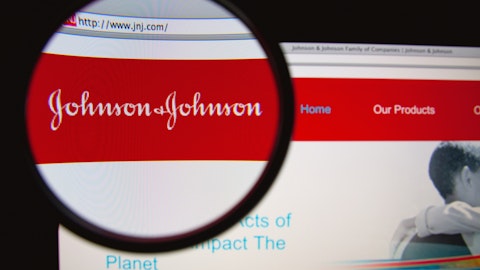In this article, we discuss 5 stocks to buy and hold for decades according to Warren Buffett. If you want our detailed discussion of Buffett’s investment philosophy, click 10 Stocks to Buy and Hold for Decades According to Warren Buffett.
5. Johnson & Johnson (NYSE:JNJ)
Number of Hedge Fund Holders: 83
Johnson & Johnson (NYSE:JNJ) is a multinational company operating in the consumer health, pharmaceuticals, and medical devices sectors. Warren Buffett has maintained a position in Johnson & Johnson (NYSE:JNJ) for more than a decade, and in Q4 2021, he held 327,100 shares of the company, worth close to $56 million.
On March 16, Bernstein analyst Lee Hambright downgraded Johnson & Johnson (NYSE:JNJ) to Market Perform from Outperform with a price target of $183, up from $180. The analyst stated that over the next several years, Johnson & Johnson (NYSE:JNJ)’s pharma business will face “an uphill battle”, given several major franchises face loss-of-exclusivity challenges.
A total of 83 hedge funds were bullish on Johnson & Johnson (NYSE:JNJ) in Q4 2021, compared to 88 funds in the previous quarter. Fundsmith LLP is the leading shareholder of the company, with 7.2 million shares worth $1.2 billion.
Distillate Capital mentioned Johnson & Johnson (NYSE:JNJ) in its Q2 2021 investor letter. Here is what the firm has to say:
“The largest additions in the rebalance, Johnson & Johnson (NYSE:JNJ) was around 50 and 40 basis points incrementally. J&J underperformed in the quarter while its normalized free cash flows held steady and so its position size was topped off to match the stable cash flows.”
4. General Motors Company (NYSE:GM)
Number of Hedge Fund Holders: 90
General Motors Company (NYSE:GM) is a Michigan-based automobile manufacturer, selling its vehicles and accessories across North America, the Asia Pacific, the Middle East, Africa, South America, the United States, and China. Berkshire Hathaway’s General Motors Company (NYSE:GM) position dates back to Q1 2012, and in the fourth quarter of 2021, the hedge fund held General Motors Company (NYSE:GM) shares worth $3.5 billion, accounting for 1.06% of the total portfolio.
On March 15, Jefferies analyst Philippe Houchois lowered the price target on General Motors Company (NYSE:GM) to $44 from $53 and kept a Hold rating on the shares. To account for “a stagflationary environment” in the automobile sector, the analyst has started adjusting estimates for greater input costs, supply chain challenges, as well as price and “potential demand destruction”.
Harris Associates is a leading shareholder of General Motors Company (NYSE:GM), owning 33.4 million shares worth $1.96 billion. Overall, 90 hedge funds were bullish on the stock at the end of December 2021.
Here is what RLT Capital has to say about General Motors Company (NYSE:GM) in its Q4 2021 investor letter:
“Despite my enthusiasm for GM’s competitive positioning in the years to come, it’s the decidedly unsexy legacy operations that keep GM’s cash registers ringing in the here and now. On that front, investor enthusiasm for the current manufacturing – and financing – of internal combustion engines remains pretty muted by most measures. And understandably so:
-GM’s operations are capital intensive,
-GM’s marketplace is highly competitive (and with excess capacity to boot),
-GM’s supply chain is super complex (e.g., semi shortage, tariffs, etc),
-GM’s labor force is (very) unionized,
-GM’s liabilities are aplenty and long-dated (e.g., warranties, recalls, lawsuits, etc),
-GM’s operations have ample – and unavoidable – commodity exposure (in both raw materials & the resulting impact on product demand/mix), and
-There’s no shortage of debt to consider.
Although that hardly represents a comprehensive accounting of the risks that crowd GM’s disclosures, it’s more than sufficient to obscure the many positives to be found under GM’s hood. Of particular note is GM’s strong showing across seemingly every facet of the changes looming over the broader automotive industry:
-Internal Combustion Engines (ICE): If you think all the talk about electric and/or autonomous vehicles is either total hogwash or still decades into the future . . . GM’s legacy business has you covered. For as long as consumers continue to demand ICE powered vehicles, GM will capably meet said demand. In fact, despite the many headwinds faced by the entire automotive industry in 2021, GM still capably sold ~6.3 million vehicles, and generated ~$113.6 billion of automotive-related revenues…” (Click here to see the full text)
3. Wells Fargo & Company (NYSE:WFC)
Number of Hedge Fund Holders: 94
Wells Fargo & Company (NYSE:WFC) is a multinational financial services company headquartered in San Francisco, California. The stock has been a part of Buffett’s portfolio since Q4 2010, although the legendary investor has drastically trimmed his stake in the firm owing to reservations about the company’s management practices. Berkshire Hathaway still owns 675,054 shares of Wells Fargo & Company (NYSE:WFC), worth $32.3 million.
On January 25, Wells Fargo & Company (NYSE:WFC) declared a $0.25 per share quarterly dividend, a 25% increase from its prior dividend of $0.20. The dividend was paid on March 1, to shareholders of record on February 4.
Deutsche Bank analyst Matt O’Connor placed a “Catalyst Call: Buy” on shares of Wells Fargo & Company (NYSE:WFC) as a short-term investment pick on February 15. The upside for Wells Fargo & Company (NYSE:WFC) will be evidence suggesting that the bank’s asset base will increase, which will be announced within the next month, the analyst told investors in a bullish thesis.
A total of 94 hedge funds held long positions in Wells Fargo & Company (NYSE:WFC), up from 88 funds in the earlier quarter. Eagle Capital Management held the biggest stake in the company, with over 20 million shares valued at $961.4 million.
Here is what L1 Capital Long Short Fund Limited has to say about Wells Fargo & Company in its Q4 2021 investor letter:
“Detailed, bottom-up stock research remains the investment team’s primary focus and the core driver of portfolio performance. 2021 once again demonstrated the team’s ability to identify ‘winners’ through extensive company and industry research across a diverse range of sectors. Key contributors included Wells Fargo, (due to its) improving compliance and operational performance, falling bad debts and progress towards removal of ‘asset cap’. Exited our holding in June at a >50% gain.”
2. Visa Inc. (NYSE:V)
Number of Hedge Fund Holders: 142
Buffett trimmed his Visa Inc. (NYSE:V) stake in Q4 2021 by 14%, and he has held the company in his portfolio since the third quarter of 2011. Warren Buffett owned 8.2 million Visa Inc. (NYSE:V) shares in the fourth quarter of 2021, worth $1.79 billion. Visa Inc. (NYSE:V) is a multinational payments technology company that is headquartered in San Francisco, California. Visa Inc. (NYSE:V) ceased its operations in Russia and disclosed that 5% of net revenues in 2021 were amassed from Russia and Ukraine.
On January 27, Visa Inc. (NYSE:V) declared a $0.375 per share quarterly dividend, in line with previous, which was distributed on March 1. On December 13, 2021, the company’s board also authorized a new $12 billion share repurchase program.
Erste Group analyst Hans Engel upgraded Visa Inc. (NYSE:V) on February 9 to Buy from Hold. The analyst noted that recovery in international travel will benefit Visa Inc. (NYSE:V)’s transaction volumes.
According to the fourth quarter database of Insider Monkey, 142 hedge funds held long positions in Visa Inc. (NYSE:V), compared to 143 funds in the last quarter. TCI Fund Management held the largest stake in the company, with more than 23 million shares worth $5 billion.
Here is what Artisan Value Fund has to say about Visa Inc. (NYSE:V) in its Q4 2021 investor letter:
“We initiated two new positions in Q4, adding Visa. Visa is a global payments company and is one of the four major US credit card networks (along with Mastercard, American Express and Discover). Visa is accepted at over 80 million merchant locations in 200 countries, interacts with 15 thousand financial institutions and processed 165 billion transactions with $13 trillion of payments and cash volume in the 12-month period ending September 2021. We have always admired Visa’s business, but its valuation prevented it from getting over the hurdle and into the portfolio. As of late, the stock has been caught up in indiscriminate selling as part of a larger unwind trade in a richly valued fintech space. Concerns also exist about Visa’s slowdown in cross-border transactions due to COVID and its net-revenue sharing arrangements with Amazon. This created an opportunity to purchase a very high quality business that benefits from substantial barriers to entry, network effects and several structural growth drivers, including consumer spending growth, the shift from cash to card, increasing ecommerce penetration, market share growth and global expansion. We believe Visa has a long runway for revenue growth as cash and checks continue to lose share. Consumers can’t use cash and checks online, after all. From a “safer” perspective, the company has a rocksolid balance sheet and has a high conversion of net income to free cash flow, which it uses for share repurchases, dividend growth and tuck-in acquisitions.”
1. Mastercard Incorporated (NYSE:MA)
Number of Hedge Fund Holders: 144
Mastercard Incorporated (NYSE:MA) is one of Warren Buffett’s oldest positions, with the billionaire first investing in the company back in Q1 2011. In the fourth quarter of 2021, Berkshire cut its stake in Mastercard Incorporated (NYSE:MA) by 8%, holding close to 4 million shares worth $1.4 billion.
On March 7, Mastercard Incorporated (NYSE:MA) announced a 5-year global partnership with Zeta, a fintech unicorn specializing in next-generation credit card processing. The companies will jointly launch credit cards to banks and fintechs worldwide on Zeta’s modern credit processing stack, integrated with Mastercard Incorporated (NYSE:MA)’s digital issuance and loyalty solutions.
Mastercard Incorporated (NYSE:MA) declared on February 8 a $0.49 per share quarterly dividend. The dividend will be paid on May 9, to shareholders of record on April 8.
Tigress Financial analyst Ivan Feinseth raised the price target on Mastercard Incorporated (NYSE:MA) to $472 from $460 and reiterated a Strong Buy rating on the shares on March 4, given the company’s “strong” Q4 results as consumer spending remained strong regardless of omicron headwinds.
Akre Capital Management is the largest Mastercard Incorporated (NYSE:MA) shareholder as of the close of Q4 2021, with 5.8 million shares worth $2.10 billion. Overall, 144 hedge funds were long Mastercard Incorporated (NYSE:MA) at the end of December 2021.
Here is what VGI Partners has to say about Mastercard Incorporated (NYSE:MA) in its Q4 2021 investor letter:
“Mastercard has been a core constituent of the VGI Partners global strategy since 2009. Mastercard is a global payments processor and in an effective duopoly with Visa. The industry benefits from a strong secular trend toward electronic payments over cash and cheques and the COVID pandemic has accelerated this shift.
Mastercard’s share price increased +1% in calendar 2021 despite more than 25% earnings growth. This was due to Mastercard’s market multiple de-rating due to short-term concerns about cross-border volumes and long-term concerns about disintermediation from fintechs such as PayPal and Square (see the chart below showing Mastercard’s EV/EBITDA multiple during 2021 de-rating from >30x to ~26x).
Whilst the full recovery in cross-border travel has been delayed by the onset of Delta and Omicron, we believe there is significant pent-up demand for travel and that cross-border transaction volumes can exceed 2019 levels by 2023.
Interchange fees have long been a point of contention between the payment processors and merchants so the news that Amazon UK would no longer accept Visa credit cards rekindled fears that there would be a race to the bottom in merchant discount rates. Amazon and Visa have since come to a resolution and we think it is highly unlikely that other merchants will take a similar step. Nevertheless, we are closely monitoring the situation for further developments…” (Click here to see the full text)
You can also take a look at 10 ETFs to Buy and Hold for the Next 10 Years and Top 10 Stock Picks of Julian Robertson’s Tiger Management.





